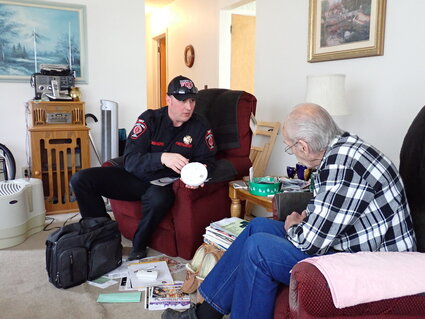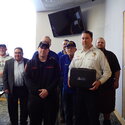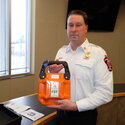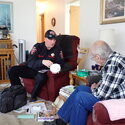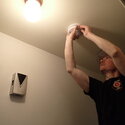CAFD zeroes in on house fire prevention
Free smoke alarms have saved eight lives so far
April 26, 2024
Jason Eckenberg and Adam Swanson walked through the home of Cloquet resident Ed Enlund on a routine home safety visit Monday. The Cloquet Area Fire District firefighter/EMTs took note of which rooms needed smoke alarms, pulled out a ladder, and got to work.
"I'd say it improves my living spaces and probably my life - more my life than living spaces," Enlund said.
The lifespan of a smoke alarm is about 10 years. The CAFD's home safety visit program and American Red Cross's Home Fire Campaign began around 2015. So in addition to the usual push to get homeowners free smoke alarms, Eckenberg said they are contacting past clients."We want to make sure that we get back into these houses before the 10-year mark and their equipment goes bad," Eckenberg said.
The CAFD's home safety visit program has installed 826 free smoke detectors, accounting for 20 percent of the alarms installed through the Red Cross's Northern Minnesota chapter since the campaign began. Over that nine-year period, the program saved two households, or eight lives, four of whom were children.
Independently of the Red Cross, the CAFD installs free carbon monoxide detectors. At the CAFD board meeting April 17, the board accepted a grant from the Fond du Lac Band of Lake Superior Chippewa for 36 combination smoke-and-carbon monoxide alarms and 180 smoke alarms detectors for use by Band members, supplementing the supply of smoke detectors provided by the American Red Cross.
"The biggest thing is, the program is free," Eckenberg said. However, the devices must be installed by the fire department.
Dan Williams, the executive director of The American Red Cross Serving Northern Minnesota, said when smoke alarms are simply handed out, fewer than two-thirds get installed. Similarly, Eckenberg said some smoke detectors have failed to go off because they were never fully activated by the homeowner. That is why both the CAFD and the Red Cross have trained people to install the alarms.
Home safety visits are typically scheduled a month in advance for anyone in the fire levy area. As of Monday, May's schedule was still fairly open.
"Even if you're not sure if you're in the area that we would be covering, call the station because we can get you in touch with the Red Cross and make sure that you get smoke detectors that you need," firefighter/EMT Katrina Brzeskiewicz said.
The safety visit to Enlund's home followed the typical routine. With an installation plan agreed upon, the firefighter duo split the work: Swanson installed while Eckenberg sat down with Enlund to share flyers and go over safety information. Other tasks include inspecting fire extinguishers and educating on general fire safety.
"I don't care what your house looks like. I just want to protect it," Eckenberg told the Pine Knot, explaining that although some people are embarrassed by their clutter, it is especially important that those homes have functioning alarms given the potential fuel source.
To schedule a home safety visit, call the fire district at (218) 499-4258 or visit http://www.cloquetareafiredistrict.com/outreach/community/home-safety-visits. To reach the Red Cross, visit http://www.redcross.org/local/mn-nd-sd/about-us/our-work/home-fire-campaign."
Reducing fire hazards
With spring in full swing and summer on the way, Brzeskiewicz wants people to be aware of fire risks these seasons bring.
"Just be aware of the wind, the other dry grass, things like that," she said. "A fire in the yard could easily lead to a house fire when it's really windy out because you have those embers that will blow."
Williams said to be attentive when cooking, since leaving it unattended presents a major house fire risk. "Teach good cooking safety habits like not starting something cooking and then go do a bunch of errands in the house and then come back to it," he said.
Both Williams and Brzeskiewicz stressed the importance of having an evacuation plan.
"What often happens is a house fire happens, people leave out of different doors, the person's not sure if the person got out, so they run back in and end up dying in the house fire when their family members are sitting out in the backyard," Williams said.
Brzeskiewicz said the best plan of action is to know two ways out of any room and out of the house at all times, and to establish a meeting place at the end of the driveway, by a large recognizable tree or the mailbox.
"The other thing with knowing two ways out of the room, even if that second way out is a window that's on a second story that you might not be able to get down out of, still go to that window. That's a way out of the house," she said, adding that the incident commander will check the windows for people who may be inside.
Community risk reduction officer
The public education and prevention division is a three-person shop of paid on-call members that has been without a public education officer for nearly two years. That will change after the CAFD board voted to appoint Caitlin Wright, formerly of Cloquet Community Education, to the revamped Community Risk Reduction Officer position at the April 17 meeting.
The CRRO duties outlined in the job description include developing and managing the district's risk reduction program, conducting community outreach, and serving as a public information officer as needed.

Noah Beardslee
Adam Swanson installs a smoke detector in Ed Enlund's hallway on a Cloquet Area Fire District home safety visit.
"I think I'm most excited to help more people in our community and to build those relationships and to support the fire district," Wright said. "That's kind of my passion, just helping others in some way shape or form, and I feel like this is a great opportunity to do that through educational components."
During last week's meeting, CAFD chief Jesse Buhs said the new position will enhance the public's understanding of the district as well as the "quality of life for those who live, work and visit the community we serve."
Eckenberg said it would be nice to have Wright continue the public education programs and expand on them.
"I'm excited to have Caitlin here because it takes a lot off of our plates," he said. "Having full-time jobs elsewhere, it's tough to be here every day off, and it's important to us. That's why we do it."
